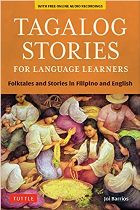BROWSE
Categories



- Home
- By Culture
- Filipino
- Tagalog Stories for Language Learners: Folktales and Stories (Tagalog-English)
Tagalog Stories for Language Learners: Folktales and Stories (Tagalog-English)
Product Description
Author:
Paperback: 224 page(s)
Age Range: 8 - 12
Ontario curriculum: Language - Reading
Book Description:
This book introduces 40 stories from the Philippines through bilingual Tagalog and English texts presented on facing pages. Paired with cultural notes, vocabulary lists, exercises, comprehension questions and free online audio recordings, Tagalog Stories for Language Learners is an excellent resource for intermediate language learners.
This compilation includes a mix of traditional folktales retold for a modern audience, as well as several well-known works of contemporary Philippine literature. Along the way, you will meet fabulous mythological characters like the Bagobo goddess Mebuyan and the shape-shifting Aswang. Other characters cope with day-to-day issues, such as the domestic worker who cannot find her keys and a beauty queen who leaves behind her comfortable city life in order to help peasants in the countryside.
Four of the stories are by well-known Filipino writers and are presented in complete or partially condensed form. These include:Estrangheritis by Inigo Ed. Regalado (1907)--The writer is critical of Filipinos who exalt all things foreign while, in fact, benefitting from their own land but unappreciative of their national culture.Desire by Paz Latorena (1928)--The story of a Filipino woman who has to deal with the narrow-mindedness of a foreigner who is far more interested in her body than in her personality.Greta Garbo by Deogracia Rosaro (1930)--Monina, who looks like Greta Garbo, plans a weekend getaway with her beau, only to be left at the station waiting, and later discovers he has gone on a honeymoon!Maria Elena Paterno's Sampaguita (1991)--Two popular legends about the Sampaguita (Philippine jasmine flower) which touch on the themes of courage and forbidden love.
Stories from different periods are presented so learners get a feel for authentic Filipino texts.
 Loading... Please wait...
Loading... Please wait... 

